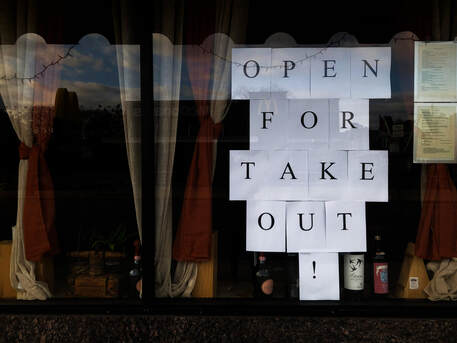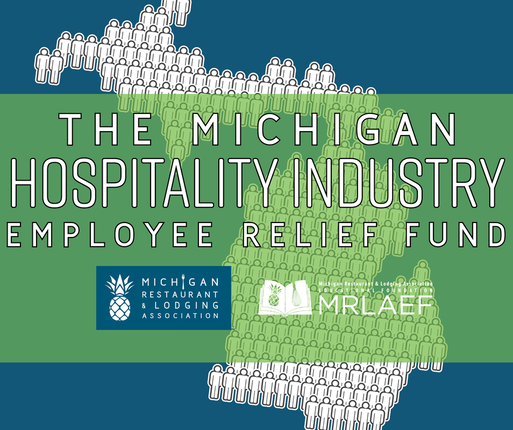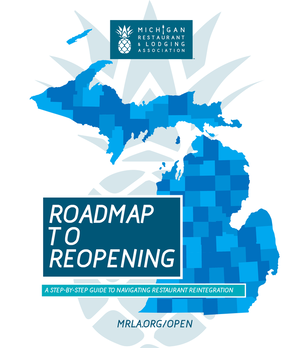A Cultural Shift for the Industry: COVID-19

Michiganders miss their family dinners and the best burger in town; they’re longing for the summer sun and venturing out for Superman ice cream and a cold craft beer. They miss the connections that come from these moments — the ones shared around tables, over meals and drinks, with Michigan treats in-hand. Family and friends are counting down the days until they can pack their car and head north for their annual trip to Mackinac Island. They miss Michigan’s hospitality industry and our services just as much as we miss them.
As of March 23, 2020, Michigan residents were placed on a mandatory stay-at-home order due to the rapid spread of COVID-19. The stay-at-home and social distancing orders meant to slow the spread of the coronavirus put restaurant dining on hold; all nonessential businesses were forced to shut down and send their employees home, leaving some barely surviving. Yes, this global pandemic changed the industry as we know it — but, while some challenges are devastating, this presents an opportunity to deliver a whole new meaning of the guest experience, possibilities to provide unique services, and community support at its finest.
What Do the Numbers Tell Us?
In a matter of three weeks, a survey by The Michigan Restaurant & Lodging Association proved just how hard the industry was hit, giving a deeper understanding of what’s happening now and what may lie ahead.
March
In the first 22 days of March alone, restaurant operators reported a 43 percent decline in sales, and the Michigan restaurant and foodservice industry lost an estimated $491 million in sales, and more than 72,000 jobs. Because of this, Michigan restaurant operators took a number of actions during the first three weeks of March in response to the COVID-19 outbreak:
April
On average, restaurant operators reported a 77 percent decline in sales during the period from April 1 to April 10. Based on these early results, the National Restaurant Association estimated that the Michigan restaurant and foodservice industry would lose more than $1.2 billion in sales in April if the trends continued through the end of the month. With that, more doors will close. [5]
The COVID-19 impact data will be released for May soon.
As of March 23, 2020, Michigan residents were placed on a mandatory stay-at-home order due to the rapid spread of COVID-19. The stay-at-home and social distancing orders meant to slow the spread of the coronavirus put restaurant dining on hold; all nonessential businesses were forced to shut down and send their employees home, leaving some barely surviving. Yes, this global pandemic changed the industry as we know it — but, while some challenges are devastating, this presents an opportunity to deliver a whole new meaning of the guest experience, possibilities to provide unique services, and community support at its finest.
What Do the Numbers Tell Us?
In a matter of three weeks, a survey by The Michigan Restaurant & Lodging Association proved just how hard the industry was hit, giving a deeper understanding of what’s happening now and what may lie ahead.
March
In the first 22 days of March alone, restaurant operators reported a 43 percent decline in sales, and the Michigan restaurant and foodservice industry lost an estimated $491 million in sales, and more than 72,000 jobs. Because of this, Michigan restaurant operators took a number of actions during the first three weeks of March in response to the COVID-19 outbreak:
- More than 60 percent of restaurant operators laid-off employees or cut their hours. Many more anticipated doing more of this during the next 30 days.
- Sixty percent of operators reduced their hours of operation and 41 percent of operators temporarily closed their restaurant.
- Forty-four percent of operators temporarily changed their business model to off-premises
- One percent of operators permanently closed their restaurant, and nine percent anticipate permanently closing their restaurant within the next 30 days.
April
On average, restaurant operators reported a 77 percent decline in sales during the period from April 1 to April 10. Based on these early results, the National Restaurant Association estimated that the Michigan restaurant and foodservice industry would lose more than $1.2 billion in sales in April if the trends continued through the end of the month. With that, more doors will close. [5]
- Fifty-three percent of Michigan operators said they temporarily closed their restaurant since the beginning of the coronavirus outbreak in March, and 51 percent of operators anticipated temporarily closing during the next 30 days.
- Two percent of Michigan operators said they permanently closed their restaurant since the beginning of the coronavirus outbreak in March — four percent of operators anticipate permanently closing within the next 30 days.
- Eighty-eight percent of Michigan restaurant operators say they have laid off or furloughed employees since the beginning of the coronavirus outbreak in March.
- Fourteen percent of Michigan operators anticipate laying off or furloughing additional employees during the next 30 days. Among restaurant Michigan operators that laid off or furloughed employees, the average reduction was 87 percent of the restaurant’s total staff.
The COVID-19 impact data will be released for May soon.

A Cultural Shift for the Industry
At the urging of MRLA, Governor Whitmer deemed restaurants and hotels as one of the essential businesses to remain open, even though eat-in dining room service is suspended during this time. Now we’re being challenged to rewire our thinking of the entire hospitality industry. Despite the devastating number of closures, many restaurants and bars have adapted quickly to this unprecedented crisis, managing to keep operations running by shifting their business models to match the current demand for “shelter in place” eating experiences. In early April, 53 percent of Michigan operators said that services continued for off-premises traffic only. These business models don’t stop at takeout and delivery services — all across Michigan, restaurants have turned to bulk foods, grocery sales, and meal kits to make up for lost revenue.
Turning Dinner into Groceries
From large chains to mom-and-pop eateries, restaurants are becoming increasingly dependent on grocery sales to make up for lost revenue and continue operations — selling items they already sell, just in a different form. Traditional grocers are struggling to keep up with demand, and restaurants opening up temporary grocery stores helps bump up the number of supermarkets in the country, which eases store crowding or bottlenecked delivery. It's also a way to try to support struggling suppliers. The Gandy Dancer, a popular restaurant in Ann Arbor, now doubles as a grocery store, offering staples like milk and bread, as well as meats and fish from its own pantry.
The MRLA and Michigan Department of Agriculture & Rural Development (MDARD) have formed a statewide partnership to provide labeling training to the hospitality industry that will enable the sale of food and pantry items. Through this new partnership, restaurants can receive training on proper labeling so they can sell food and pantry items directly to consumers, which not only offers more options to Michigan consumers, but also keeps the supply chain moving in more directions.
Coming Together While Staying Apart
Right now, the industry is not just about food service, but also about the people we serve — those who want to maintain a sense of community during these tumultuous times. Loyal customers return because they support the values of the people who greet them for family meals; who serve them dinner and drinks after long days; and those who provide a place to gather for celebrations of every kind. These are the people that keep coming back for service, and we need them more than ever.
The question remains, how can we continue to support the people and communities that we rely on for prosperous business? Since they can’t be here with us, how can we engage them and improve their well-being? Food service aside, many businesses are contributing to community efforts in their own creative ways.
At the urging of MRLA, Governor Whitmer deemed restaurants and hotels as one of the essential businesses to remain open, even though eat-in dining room service is suspended during this time. Now we’re being challenged to rewire our thinking of the entire hospitality industry. Despite the devastating number of closures, many restaurants and bars have adapted quickly to this unprecedented crisis, managing to keep operations running by shifting their business models to match the current demand for “shelter in place” eating experiences. In early April, 53 percent of Michigan operators said that services continued for off-premises traffic only. These business models don’t stop at takeout and delivery services — all across Michigan, restaurants have turned to bulk foods, grocery sales, and meal kits to make up for lost revenue.
Turning Dinner into Groceries
From large chains to mom-and-pop eateries, restaurants are becoming increasingly dependent on grocery sales to make up for lost revenue and continue operations — selling items they already sell, just in a different form. Traditional grocers are struggling to keep up with demand, and restaurants opening up temporary grocery stores helps bump up the number of supermarkets in the country, which eases store crowding or bottlenecked delivery. It's also a way to try to support struggling suppliers. The Gandy Dancer, a popular restaurant in Ann Arbor, now doubles as a grocery store, offering staples like milk and bread, as well as meats and fish from its own pantry.
The MRLA and Michigan Department of Agriculture & Rural Development (MDARD) have formed a statewide partnership to provide labeling training to the hospitality industry that will enable the sale of food and pantry items. Through this new partnership, restaurants can receive training on proper labeling so they can sell food and pantry items directly to consumers, which not only offers more options to Michigan consumers, but also keeps the supply chain moving in more directions.
Coming Together While Staying Apart
Right now, the industry is not just about food service, but also about the people we serve — those who want to maintain a sense of community during these tumultuous times. Loyal customers return because they support the values of the people who greet them for family meals; who serve them dinner and drinks after long days; and those who provide a place to gather for celebrations of every kind. These are the people that keep coming back for service, and we need them more than ever.
The question remains, how can we continue to support the people and communities that we rely on for prosperous business? Since they can’t be here with us, how can we engage them and improve their well-being? Food service aside, many businesses are contributing to community efforts in their own creative ways.
- Founders Brewing Co. launched a work-at-home line of apparel with all proceeds donated to The Michigan Hospitality Industry Employee Relief Fund to support restaurant, bar, and lodging workers who have been affected by COVID-19.
- Birmingham craft brewer Griffin Claw Brewing Co. repurposed its distillery operations to make hand sanitizer.
- The MRLA partnered with At&T to serve meals to frontline healthcare workers at TCF Center and Suburban Showplace field hospitals. Through this partnership, the industry committed to serving 10,000 meals to healthcare workers.

Resources from the MRLA
The Michigan hospitality industry consists of 600,000 team members and the COVID-19 crisis has displaced a majority of those dedicated individuals. As COVID-19 continues to impact our industry in Michigan, we are continuously sharing all available resources to the entire hospitality industry as they become available. Our website has all the resources in one place, and all information provided is from the Centers for Disease Control and Prevention (CDC) and other reputable resources.
The MRLA created a specific page of resources to assist employees as they navigate these uncertain and unprecedented times. From direct access to federal resources and unemployment information, to mental health and food distribution resources, employees are supported. Employees can access this information by visiting the home page of MRLA website.
The Michigan Hospitality Industry Employee Relief Fund
Supported by the Michigan Restaurant & Lodging Association Educational Foundation, this fund is designed to assist employees of Michigan's restaurant and lodging industry who need support after the COVID-19 pandemic.
The Michigan hospitality industry consists of 600,000 team members and the COVID-19 crisis has displaced a majority of those dedicated individuals. As COVID-19 continues to impact our industry in Michigan, we are continuously sharing all available resources to the entire hospitality industry as they become available. Our website has all the resources in one place, and all information provided is from the Centers for Disease Control and Prevention (CDC) and other reputable resources.
The MRLA created a specific page of resources to assist employees as they navigate these uncertain and unprecedented times. From direct access to federal resources and unemployment information, to mental health and food distribution resources, employees are supported. Employees can access this information by visiting the home page of MRLA website.
The Michigan Hospitality Industry Employee Relief Fund
Supported by the Michigan Restaurant & Lodging Association Educational Foundation, this fund is designed to assist employees of Michigan's restaurant and lodging industry who need support after the COVID-19 pandemic.

The Roadmap to Reopening
In early May, the MRLA released their “Roadmap to Reopening,” a step-by-step guide to navigating restaurant reintegration. It features comprehensive guidelines and checklists to put restaurateurs in a position to safely reopen operations, while giving the general public confidence that they can safely return to their favorite restaurants.
“The Roadmap to Reopening is thoughtful and thorough guidance for restaurant operators, incorporating the best practices of several federal agencies, relevant content from existing executive orders and innovative recommendations from our involvement in the Michigan Economic Recovery Council,” said Justin Winslow, President and CEO of the MRLA.
The MRLA Roadmap to Reopening publication provides Michigan restaurateurs with eight checklists that collectively address all aspects of restaurant operations:
• Expand and establish cleaning procedures
• Develop a COVID-19 response team, customized for small restaurants and large chains
• Employee health and PPE requirements
• Customer health and social distancing
• Managing food pick-up and delivery
• Verify third parties, guidance for working with vendors and suppliers
• Reopening water systems for safe consumption and use
• Menu and the supply chain
The MRLA shared the Roadmap with Governor Whitmer so that she and her administration can provide restaurants across the state the necessary processes and procedures to safely reopen. The MRLA reaffirms its position that restaurants should be allowed to reopen on May 29 upon the expiration of Executive Order 2020-69. The MRLA is keeping its focus on the rest of the industry as they look at what’s ahead; a Roadmap to Reopening publication for hotels and lodging will be released within the next couple of weeks.
What Lies Ahead
It’s not entirely possible to predict exactly what the hospitality industry will look like after the coronavirus outbreak subsides, but one thing is clear, this crisis will have a lasting impact on how we eat, travel, and gather. Restaurants and lodging facilities are no longer solely the realm of special occasions and trips, but now our important public places and neighborhood anchors. Hospitality is built around the necessity of physically coming together, something that can’t be totally replaced by computers. The COVID-19 virus has challenged industry leaders to adjust by welcoming new approaches to operations and customer service. Despite the questions remaining about what’s ahead, the road to reopening holds the same sentiment as the true Michigan experience. Soon enough, locals and visitors alike will gather again around what brings them together — food, travel, community, and the sense of resilience through tough times.




